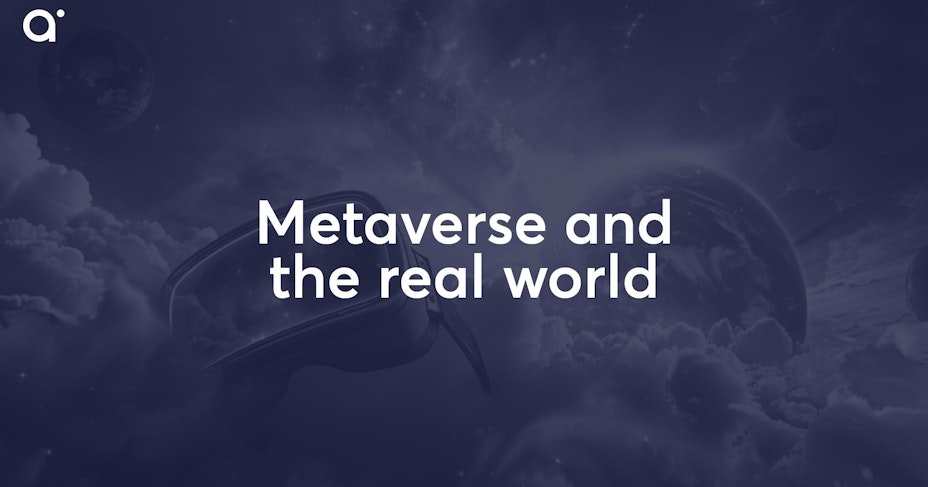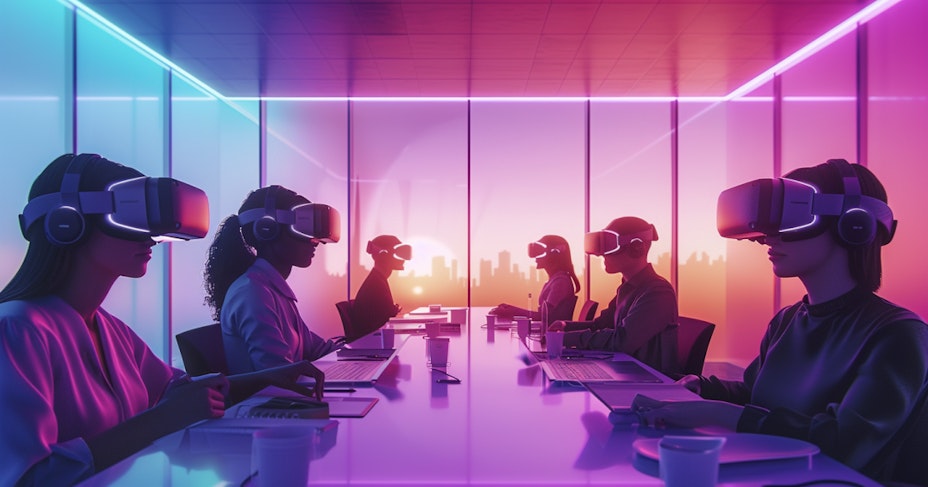Metaverse and reality
- 12 minute read

The metaverse and reality have an ambivalent relationship. In some forms of metaverse it will resemble reality as much as possible, in other forms as little as possible.
For example, a metaverse focused on meetings that have a professional function, such as a work meeting, will be much more similar to our physical reality than a gaming metaverse, where you go for a while to switch off from our reality.

- A metaverse is a virtual online 3d world where you walk around with an avatar and can interact with other avatars
- A metaverse means a universe coexisting with known reality
- The word metaverse was coined by Neil Stephenson in a scifi novel called "Snow Crash"
- Virtual Reality is a simulation created by a computer and can be a useful tool for a variety of things
- Augmented Reality is reality augmented by computer generated aspects, as in Pokémon Go
- Blockchain, cryptocurrency and the NFT have made the metaverse attractive to Components of a metaverse listed
- Advantages and disadvantages of a metaverse
- What will the future of the metaverse look like?
Inhoudsopgave
- What is a metaverse?
- The metaverse and cryptocurrency
- Definitions metaverse
- Metaverse and reality: benefits
- Metaverse and reality: disadvantages
- Future of the metaverse
What is a metaverse?
A metaverse is a virtual online world where you walk around with an avatar (digital doppelganger or self-composed character) and can interact with anything you encounter. You can fall off a cliff and die virtually in these worlds, have conversations with other digital avatars and build a whole second world, where you look a lot like yourself or not.
Meaning of the word metaverse
The word metaverse is a compound of meta and verse, where meta stands for (among other things) next to or on top of. Verse is an abbreviation of universe. So this compound more or less means a universe on top of or in addition to the physical universe we all know.
The word metaverse was coined by Neal Stephenson in his 1992 scifi novel "Snow Crash."
What is virtual reality?
Virtual reality (VR) is a simulation created by a computer. If you put on a special VR headset, you can experience images and sounds in 3d and also speak to other characters in the simulation yourself through a built-in microphone and speaker. The special feature is that you experience things in the first person.
In a metaverse, virtual reality is a regular feature.
Movies that deal with virtual reality include "The Matrix," "Avatar" and "Inception." In some movies, you can put on VR glasses and appear to be in the middle of the action yourself.
Simulations in a metaverse
Virtual reality is very useful in games, but also in real life. Just imagine doing dangerous things that take a lot of practice to get good at. If you do something wrong you and perhaps many others will die or be injured.
A well-known concept of this is the flight simulator. It allows you to practice flying until you never crash again. Only then are you ready for the big time. This saves a lot of lives.
What should you do in the event of an accident in a nuclear reactor? You don't like to make something like that up on the spur of the moment, nor do you want to practice it in practice. Then a simulator is a very useful tool.
More fun variations include virtually playing soccer against Messi, singing along with Mick Jagger or punching an alien in the mouth. Anything is possible in a simulator, where spectacular virtual representations can be quite common.
Cost savings virtual gathering

Professionals can save a lot in logistics and transportation by meeting virtually. Virtual concerts are a lot more economical, both for the artist and the visitor. In the fashion world, you can hold virtual fashion shows to see which clothing lines are popular, and you can even dress avatars with the right sizes virtually, so buyers can see right away how it would look. This new positioning can represent lasting practical value for consumers, although it may take some time to replace current reality.
What is augmented reality?
Augmented (augmented) reality (AR) is reality as we experience it together, augmented by elements generated by a computer. A good example is the Google Glasses, where you see both the real world but also computer images.
Another example that caused some fuss was Pokémon Go. This involved catching virtual critters that you could find using AR and GPS. This did show that there are quite a few snags in AR and VR when realized in physical reality.

The metaverse and cryptocurrency
What is the metaverse seems to be the same question, but is not. The Metaverse theoretically means a virtual world that encloses all other virtual worlds. In such a new reality, you could walk around Horizon Worlds with a puppet from Decentraland and vice versa. A tank from Spider Tanks could go mothballing on an alien planet from Alien Worlds. A NFT from one world could also be used in another.
Integration of metaverse
The idea of an interoperable metaverse is unlikely to be possible in the near future and may never become a reality. This is not only because such a huge project requires enormous computing power, which we do not yet have, but also because most worlds do not really fit together in terms of content. How could you ever integrate a card game, a social game and a war game? At the moment, this is still a vision of the future.
A philosophical speculation
The only version in which this vision of the future has ever combined everything is our own physical world, in which one character plays a war game, another blogs a bit and the next plays a haute couture game. Who says all this is not simulation à la Matrix? The developers who pulled this off must have used very special techniques to virtually assemble our reality so that it looks the same every day! Although the occasional glitch in the Matrix would help us not take everything so seriously, because here we are playing Second Life in what we also call the real physical world.

Definitions metaverse
All sorts of definitions have come into vogue, due to the fact that metaverse is actually a catch-all term. Some things do keep coming back, which is why I think it makes more sense to provide a list of similarities:
- A metaverse is in 3D
- It is virtual
- It is infinite
- It is timeless
- It has an independent economy
- Participants also create
- It is synchronous
- It is in real time
Metaverse and reality: benefits
- A metaverse is infinite
- Laws of nature do not apply in a metaverse
- Physical or other restrictions are lifted in the metaverse
- Dangerous things can be tried dangerously in a metaverse
- Products can become much cheaper using a metaverse
- Successful metaverses can create many new jobs
- In a metaverse, you can meet virtually while sitting in the park in the sun, so you don't have to meet in that musty office
- With the advent of the NFT, you have personal property in a metaverse
- Cryptocurrency gives value to a metaverse
Metaverse and reality: disadvantages
- Big companies like Meta and Google have even more private data about you from conversations with other avatars and possibly from your body language
- Advertising can be so intrusive and eerily precise directed at you that you start to engage in self-censorship
- A metaverse takes a huge amount of computing power and has a heavy carbon footprint
- The more people join, the faster the metaverse can't handle it anymore and the scalability will fall short
- What rights and obligations do participants have, should laws be invented?
- Private metaverses can put you at a severe disadvantage by suddenly confronting you when you have played for years with high dues and the like to still be allowed to participate
- A metaverse can be addictive and perceived as more fun than hard reality
- A metaverse can make everything seem so beautiful that you lose your grip on reality
- Public health could be at stake if people spend too much time sitting at their computers and eating poorly
- Real physical social interaction can be greatly diminished by a metaverse and thus become more difficult when you are back in the physical world
- Most metaverses are still quite empty and the general public sees little in the concept or has yet to discover it
Future of the metaverse
The metaverse and reality can coexist just fine. They are both friend and foe. As with everything: excess damages.
A single virtual world enclosing all others is impossible at this time and probably for a very long time. However, building multiple metaverses is very possible. The more worlds and competition, the more joy.
The metaverse is currently still heavily underdeveloped and yet already very popular. So it is only a matter of time before developments are so advanced that games play equally well via Web3 and virtual environments are as good as with the usual completely flat layout of professional 2D environments.
For a very comprehensive article on the metaverse please refer to our Academy.


